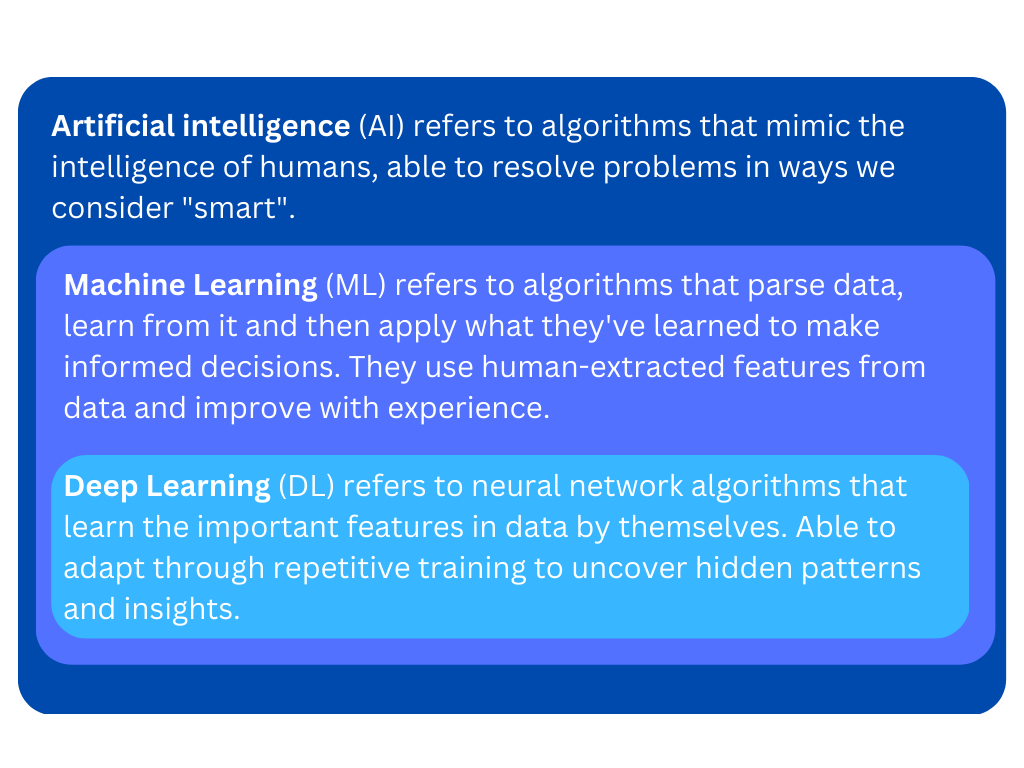What does AI mean?
The new Industrial Revolution is already here. What is Artificial Intelligence (AI), its applications and why businesses that use AI effectively and ethically are more likely to remain competitive.
What is AI and its subsets?
Source: IBM, Rodrigo Ceron, (December, 2019), AI, machine learning and deep learning: What’s the difference?
Examples of AI applications
Customer Relationship Management (CRM) tools: AI-powered CRM platforms can analyze customer data, automate interactions, and provide personalized recommendations to sales teams, improving customer satisfaction and retention.
Virtual Assistants: AI-based voice and chat assistants can schedule appointments, answer questions, and provide quick access to information, helping business professionals stay organized and efficient.
Predictive Analytics: AI-driven analytics tools can sift through vast amounts of data to identify trends, forecast demand, and optimize pricing strategies, enabling businesses to make data-driven decisions.
Natural Language Processing (NLP): Advanced NLP algorithms can understand and generate human-like text, enabling businesses to automate customer support, content creation, and sentiment analysis.
Robotic Process Automation (RPA): RPA software can automate repetitive tasks like data entry, invoice processing, and payroll management, saving time and reducing human errors.
Supply Chain Management: AI-powered platforms can analyze historical data and real-time information to optimize inventory levels, route planning, and demand forecasting, streamlining supply chain operations.
Talent Acquisition: AI-driven recruitment tools can automate candidate screening, assess skills, and predict job performance, helping businesses make more informed hiring decisions.
Cybersecurity: AI-enhanced cybersecurity tools can detect and prevent cyber threats by analyzing patterns and anomalies in data, improving security and reducing risks.
AI-Driven Marketing: Platforms that use AI to analyze customer behavior, segment audiences, and automate personalized marketing campaigns can help businesses attract and retain customers.
Financial Analytics: AI-powered financial analysis tools can process large datasets, detect anomalies, and predict financial trends, assisting businesses in making better investment decisions.
These examples demonstrate the transformative potential of AI across various business functions and industries. By harnessing the power of AI, business professionals can make smarter decisions, optimize processes, and drive innovation.
Why should you consider using AI in your business?
Businesses that embrace the new era of digital transformation and incorporate AI into their processes are poised to gain a competitive edge by:
Enhancing efficiency and productivity: AI-driven solutions can automate repetitive tasks and optimize complex processes, enabling businesses to achieve higher levels of efficiency and productivity.
Minimizing errors and improving risk management: AI can increase the accuracy of data analysis, leading to more informed decisions and better risk management strategies.
Facilitating better decision-making through data analysis: AI empowers businesses to make well-informed decisions by processing vast amounts of data and extracting valuable insights.
However, the debate surrounding the ethical use of AI, its lack of human empathy, and the potential displacement of human workers in some industries remains ongoing.
As the AI industry continues to grow, a wide range of companies are developing and marketing AI solutions for businesses. This includes both established tech giants, such as IBM, Nvidia, Google, Microsoft, and Apple, as well as innovative startups that can be found through search engines or communities like the NoCode.ai.
By exploring these resources, businesses can find AI solutions tailored to their unique needs and challenges.
Where to start applying AI within your business?
As a decision-maker, now may be the perfect time to consider integrating AI into your business strategy. To make informed choices, it's crucial to grasp the fundamentals of AI, explore its applications through relevant use cases, and familiarize yourself with the wide array of AI tools available for implementation.
Numerous educational resources are accessible to professionals seeking to learn about AI, including courses offered by universities, training providers, and industry experts. These programs can help bridge the knowledge gap and enable you to confidently navigate the rapidly evolving AI landscape, ultimately empowering you to leverage AI solutions to drive business success. Find below some examples:
· Coursera – IBM AI Foundations for Everyone Specialization
· MIT – AI Leadership
· NoCode.ai - The AI Bootcamp
· Berkeley ExecEd – Artificial Intelligence: Business Strategies and Applications
Also, there is a growing range of AI professionals in the market such as Data Scientists, AI researches, project managers and developers.
Conclusions
AI, a rapidly evolving field within computer science, boasts a broad spectrum of applications and holds the potential to transform numerous industries.
In conclusion, AI is no longer the stuff of science fiction—it's already here. Businesses aiming to thrive in the future should begin investing in this groundbreaking technology. Although we may not be fully aware, we are currently in the midst of a new Industrial Revolution that will undoubtedly reshape the way we work and interact with the world. Embracing AI now can position businesses for long-term success and innovation in this ever-changing landscape.
Other sources:
IBM. What is Artificial Intelligence?
NoCode.ai. The Blog
javaTpoint. Application of AI





